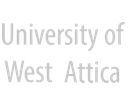Distributed Processing for Knowledge Management in cooperative eGovernment administration projects
Abstract
Keywords
References
Abecker A., Bernardi A., Hinkelmann K., Kuhn O. and M. Sintek (1998a). “Techniques for Organizational Memory Information Systems”, DFKI Document D-98-02-1998.
Abecker A., Bernardi A., Hinkelmann K., Kuhn O. and M. Sintek (1998b). “Towards a Technology for organizational memories”, IEEE Intelligent Systems, May/June 1998, pp.40-48.
Abecker, A.,A. Bernardi, H. Maus, M. Sintek, C. Wenzel (2000), Information supply for business processes: coupling workflow with document analysis and information retrieval, Knowledge – based systems, vol. 13, pp. 271-284
Abecker, A., A. Bernardi, A. Ntioudis, L. van Elst, R. Herterich, C. Houy, M. Legal, G. Mentzas, S. Müller (2001) “Workflow-Embedded Organizational Memory Access: The DECOR Project”, presented at JCAI'2001 Workshop on Knowledge Management and Organizational Memories, August 2001, Seattle, Washington, USA
ADO. ADONIS – BOC Information Technologies Consulting GmbH, http://www.boc.co.at
Batini C., Viscusi G. , Cherubini D., (2009), GovQual: A quality driven methodology for E-Government project planning, Government Information Quarterly, vol. 26, pp 106–117
Belsis P., Gritzalis S., Skourlas C., Chalaris I., Malatras A. (2007), Distributed processing for Knowledge Management purposes in cooperative e-Government environments, eRA 2 International Scientific Conference, http://ikaros.teipir.gr/era/a2.htm
Bhatt G., (2002). “Management strategies for individual knowledge and organizational knowledge”, Journal of Knowledge Management, vol. 6, number 1, 2002, pp. 31-39.
Chung P., L. Cheung , J. Stader, P. Jarvis, J. Moore, A. Macintosh (2003). Knowledge based process management – an approach to handling adaptive workflow, Knowledge based systems, vol. 16, pp. 149-160
Davenport T., S. Volpel (2001). “The rise of knowledge towards attention management”, Journal of knowledge management, vol. 5, No 3, 2001, pp 212-221.
Fillies C., G. Wood-Albrecht, F. Weichhardt (2003), Pragmatic applications of the semantic web using semTalk, Computer Networks, 42, pp. 599-615
Green P., M. Rosemann (2000). Integrated process modeling: An ontological evaluation, Information systems , vol. 25, no 2, pp. 73-87
Hammer, M., and J. Champy (1993), Reengineering the Corporation: A Manifesto for Business Revolution. New York: HarperBusiness.
Kalpi B., Bernus P., (2006),"Business process modeling through the knowledge management perspective", Journal of Knowledge Management, Vol. 10 Iss 3 pp. 40 - 56
Karagiannis, D., R. Telesko (2000), The EU-Project PROMOTE: A Process-Oriented Approach for Knowledge Management. In Reimer, U. (ed.) PAKM 2000, Third Int. Conf. on Practical Aspects of Knowledge Management
Kim Y-G, S-H Yu, J-H Lee (2003). “Knowledge strategy planning: methodology and case, Expert systems with applications, vol. 24, pp 295-307.
King W., Marks P., McCoy S., (2002). “The most important issues in Knowledge Management”, Communications of the ACM, Sept. 2002, vol.45, No. 9
Ko R.., Lee S., Lee E. W.,(2009),"Business process management (BPM) standards: a survey", Business Process Management Journal, Vol. 15 Iss 5 pp. 744-791
Mahmoodzadeh E., Jalalinia Sh., Nekui Yazdi F., (2009),"A business process outsourcing framework based on business process management and knowledge management", Business Process Management Journal, Vol. 15 Iss 6 pp. 845-864
Malhotra, Y. (1998), Business Process Redesign: An Overview, IEEE Engineering Management Review, 26(3).
Nonaka I., Takeuchi H. (1995). “The knowledge Creating Company”, Oxford University Press, Oxford.
Papavasiliu G., Ntioudis S., Mentas G., Abecker A., (2002) “Business
ProcessKnowledge Modelling: Methid and tool”, DEXA Workshops 2002: 138-142.
Papavassiliou G., S. Ntioudis, A. Abecker, G. Mentzas (2003) “Supporting Knowledge Intensive Work In Public Administration Processes”, Knowledge and Process Management, forthcoming issue.
Polanyi (1966). “The Tacit Dimension”, Routledge & Kegan Paul, London.
Reimer U., Margelisch A., Staudt M (2000). “EULE: A knowledge – based system to support business processes”, Knowledge based systems, vol. 13, pp. 261-269 Riege A., (2005),"Three-dozen knowledge sharing barriers managers must consider", Journal of Knowledge Management, Vol. 9, Iss 3 pp. 18-35
Skyrme D., Amidon D., (1997),"The Knowledge Agenda", Journal of Knowledge Management, Vol. 1 Iss 1 pp. 27 - 37 van der Aalst, W.M.P., ter Hofstede, A.H.M. and Weske, M. (2003), “Business process management: a survey”, Proceedings of the International Conference on Business Process Management, BPM 2003, Eindhoven, The Netherlands, 26-27 June.
DOI: 10.18780/jiim.v2i1.3058
Refbacks
- There are currently no refbacks.






